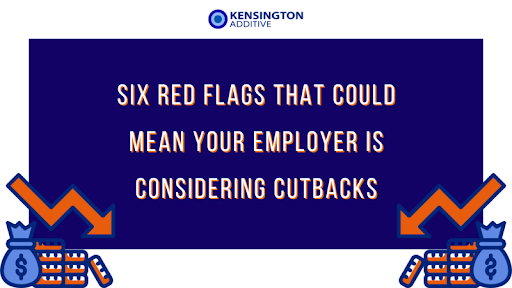SIX RED FLAGS THAT COULD MEAN YOUR EMPLOYER IS CONSIDERING CUTBACKS
November 25, 2022

No one wants to be caught off guard by a layoff. But unfortunately, even the most well-meaning employers sometimes have to make tough decisions in the face of challenging economic conditions. As an engineer, you know that changes in the business landscape can happen quickly, and it’s crucial to stay ahead of the curve.
Here are six red flags that could mean it’s time to start dusting off your resume and looking for another job.
Fewer New Recruits
If your employer suddenly stops recruiting, it could be a red flag that they are making cutbacks. There are many reasons why an employer might make cutbacks, but the most common cause is financial distress.
When an employer is in financial distress, they often stop recruiting new employees because they can’t afford to pay them. This can signify that the company is struggling and may be unable to keep all its employees much longer. If you see that your employer has stopped recruiting, it’s essential to stay alert and be prepared for potential layoffs.
While it’s not always easy to spot financial distress, sudden changes in recruitment are often one of the first signs that something is wrong. So if you’re concerned about your job security, stay informed and be ready to look for other employment if necessary.
Decrease in Overtime Work
When your employer starts cutting back on overtime, it’s often a sign that they’re trying to save money. Maybe business is slow, and they’re trying to reduce costs, or they’re anticipating future cutbacks and want to reduce their expenses now. Either way, it’s not a good sign for employees.
Overtime pay is often one of the first things to go when employers are trying to save money, so if your employer starts cutting back on overtime, it’s a red flag that they could be making other cutbacks in the future. This could mean fewer hours, less pay, or even layoffs. So if your employer starts cutting back on overtime, be prepared for the possibility of other changes in the workplace.
No New Projects Assigned
When you’re employed, you generally expect to be given some sort of job or project to do. After all, that’s why you’re being paid. So, if you find yourself in a situation where your employer isn’t giving you any new projects, it could be a red flag of pending redundancies.
Of course, there could be other reasons for this, but you should be aware of the possibility. For example, if you’re not given any new projects, it could mean that your employer doesn’t think you’re capable of handling them, so ask about training. But, on the other hand, it could also mean that they’re unsure about your future with the company and don’t want to invest too much time and energy in training you for a new role.
Whatever the reason, stay alert and keep your eye on the situation. If you notice that other employees are also being given fewer assignments, it could indicate that the company is planning to downsize. In this case, it would be wise to start looking for another job before it’s too late.
Benefit Cuts
When your employer stops providing workplace benefits like free coffee, snacks, or gym membership, it can point to financial distress. While these benefits may seem small, they can make a big difference in employee morale and productivity.
For example, free coffee or snacks can help employees stay energized and focused during long days at work. And a gym membership can help employees relieve stress and stay healthy. However, by cutting these benefits, employers may signal that they are no longer interested in investing in their employees. This can signify that layoffs or other cost-cutting measures could be on the horizon.
Changes in Upper Management
Any time your employer changes their upper management, it’s a good idea to be on alert. After all, these are the people making decisions about the company’s future – and your job. If there’s a lot of turnover in upper management, it could be a sign that the company is in trouble. Or, it could simply be that the leadership team has disagreements about the best way to move forward. Either way, it’s not a good sign for your employment.
Sometimes when a company is acquired or merged with another company, layoffs will follow soon after as the new managers try to streamline operations and reduce costs. So if there’s been a shakeup in the C-suite recently, it might be time to start polishing up your resume just in case.
Summary
No one wants to be caught off guard by a layoff – but unfortunately, they do happen from time to time. As an engineer, it’s vital to stay ahead of the curve and be aware of potential changes in the business landscape so you can plan accordingly. If you’re seeing any of these six red flags at your company, it might be time to start polishing your resume and looking for other opportunities to be prepared.
Related news
Join our newsletter
Sign up to discover the latest jobs, market insights, blogs and more

All content copyrighted Kensington Additive © All rights reserved
